
A caravanserai was a roadside inn where travelers (caravaners) could rest and recover from the day's journey. Caravanserais supported the flow of commerce, information and people across the network of trade routes covering Asia, North Africa and Southeast Europe, most notably the Silk Road. Often located along rural roads in the countryside, urban versions of caravanserais were also historically common in cities throughout the Islamic world, and were often called other names such as khan, wikala, or funduq.

Astara District is one of the 66 districts of Azerbaijan. It is located in the southeast of the country, in the Lankaran-Astara Economic Region. The district borders the districts of Lankaran and Lerik, as well as the Ardabil and Gilan provinces of Iran. Its capital and largest city is Astara. As of 2020, the district had a population of 110,000.
Bukhara or Bokhara can refer to:

The Palace of the Shirvanshahs is a 15th-century palace built by the Shirvanshahs and described by UNESCO as "one of the pearls of Azerbaijan's architecture". It is located in the Inner City of Baku, Azerbaijan and, together with the Maiden Tower, forms an ensemble of historic monuments inscribed under the UNESCO World Heritage List of Historical Monuments. The complex contains the main building of the palace, Divanhane, the burial-vaults, the shah's mosque with a minaret, Seyid Yahya Bakuvi's mausoleum, south of the palace, a portal in the east, Murad's gate, a reservoir and the remnants of a bath house. Earlier, there was an ancient mosque, next to the mausoleum. There are still ruins of the bath to the west of the tomb.

Old City or Inner City is the historical core of Baku, the capital of Azerbaijan. The Old City is the most ancient part of Baku, which is surrounded by walls. In 2007, the Old City had a population of about 3,000 people. In December 2000, the Old City of Baku, including the Palace of the Shirvanshahs and Maiden Tower, became the first location in Azerbaijan to be classified as a UNESCO World Heritage Site.

Bayil is a settlement in Baku, Azerbaijan.

The National museum of Azerbaijan literature, named after Nizami Ganjavi is a museum in Baku, established in 1939. It is located near the entrance of Icheri Sheher, not far from the Fountains Square. The museum is considered one of the greatest and richest treasuries of Azerbaijani culture.

Caravanserai of Agha Gahraman Mirsiyab Oghlu(Azerbaijani: Ağa Qəhrəman Mirsiyab oğlunun karvansarası) also known as the Masjidli Caravanserai, is located at 31 M.F. Akhundov Street in the city of Shusha. The caravanserai has been registered as an important historical and cultural monument of the country by the Ministry of Culture and Tourism of the Republic of Azerbaijan.

Sabayil Castle is a submerged medieval fortress on the coast of the Caspian Sea near Baku, Azerbaijan.

Nizami Street is a large pedestrian and shopping street in downtown Baku, Azerbaijan, named after classical Persian poet Nizami Ganjavi.

The Caravanserai is a historical monument in Sheki, Azerbaijan. A part of building is now used as a hotel.
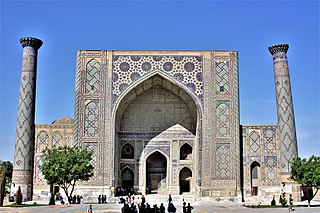
The Ulugh Beg Madrasa is a madrasa in the historic center of Samarkand, a UNESCO World Heritage Site in Uzbekistan. Together with other monuments, it forms the monumental ensemble of Registan, the old heart of the city. It was built between 1417 and 1421 by the then-Timurid governor of Samarkand, Ulugh Beg, Timur's grandson and prominent astronomer, who was later emperor between 1447 and 1449.

The Multani Caravanserai is a caravanserai located in Baku, Azerbaijan. It was established in the 14th century and is located in the Icherisheher old town, opposite the Bukhara Caravanserai.

The Small Cravanserai in Baku, Azerbaijan has a square shape and an inner quadrangular courtyard with cut corners. This caravanserai was built in the 12th century. There is a long balcony which surrounds the building of the caravanserai. The north and south entrances of the caravanserai are portal-shaped. During the Middle Ages, there was a main entrance from the sea. The caravanserai has a defensive construction and two floors on the southern side.
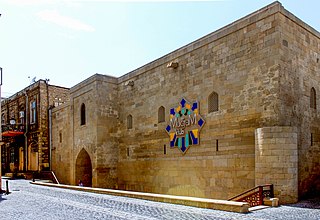
Two-storeyed caravanserai or Gasim bey caravanserai is a historic monument of the XV century. It is a part of Old City and located on Hagigat Rzayeva street, in the city of Baku, in Azerbaijan. The building was also registered as a national architectural monument by the decision of the Cabinet of Ministers of the Republic of Azerbaijan dated August 2, 2001, No. 132.
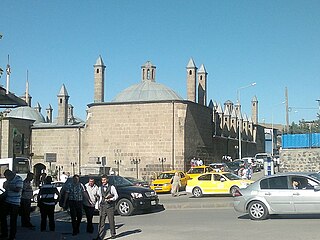
Rüstem Pasha Caravanserai, also known as Taşhan, is a caravanserai located in Yakutiye district of Erzurum, eastern Turkey, built by Ottoman statesman and grand vizier Rüstem Pasha in 1561.
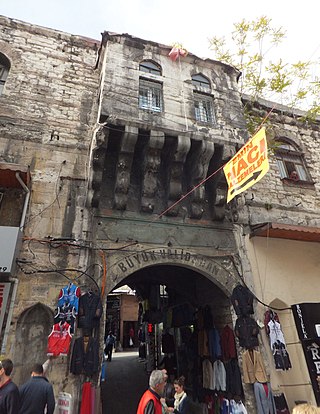
The Büyük Valide Han is the largest historic han (caravanserai) in Istanbul, Turkey. It was founded in 1651 by Kösem Valide Sultan, the mother of the Ottoman sultans Murat IV and Ibrahim.
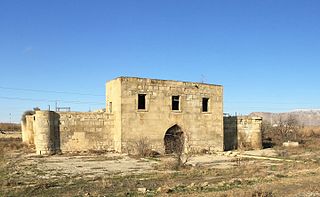
The Sangachal caravanserai is a medieval caravanserai located near the Sangachal village in the Garadagh district of Baku, Azerbaijan, 45 km far from Baku, on the old caravan route Baku - Salyan. Since the 19th century, the indicated caravan route has lost its commercial significance and in this regard, the caravanserai has ceased to be used.

The Khan's Garden is a historical garden located in Icherisheher, being part of the Baku Khans Palace's complex. The Khan's Garden is located in the first courtyard of the palace in front of the house that belonged to the Khan's family. There is a small pool in the center of the garden. Also, on the territory of the garden, there is an ovdan and a tandir.

Govkushon madrasah is an architectural monument in Bukhara, Uzbekistan. Madrasah built by Khojabor Khojas. It is part of Khoja Gaukushan Ensemble. It is an object of cultural heritage of Uzbekistan. The madrasah building of Khoja-Govkushon architectural ensemble was built in the historical center of Bukhara (Uzbekistan) in 1562-1565 during Shaybani ruler Abdulla Khan II at the expense of Khoja Saad, the sheikh of Dzhoybor. Khoja Sa'd is known by the nickname "Khoja Kalon", which is reflected in this name complex.





















